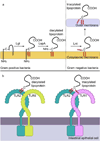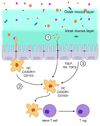Immunomodulatory mechanisms of lactobacilli
- PMID: 21995674
- PMCID: PMC3231924
- DOI: 10.1186/1475-2859-10-S1-S17
Immunomodulatory mechanisms of lactobacilli
Abstract
Over the past decade it has become clear that lactobacilli and other probiotic and commensal organisms can interact with mucosal immune cells or epithelial cells lining the mucosa to modulate specific functions of the mucosal immune system. The most well understood signalling mechanisms involve the innate pattern recognition receptors such as Toll-like receptors, nucleotide oligomerization domain-like receptors and C-type lectin receptors. Binding of microbe-associated molecular patterns with these receptors can activate antigen presenting cells and modulate their function through the expression of surface receptors, secreted cytokines and chemokines. In vitro the cytokine response of human peripheral blood mononuclear cells and dendritic cells to lactobacilli can be strikingly different depending on both the bacterial species and the strain. Several factors have been identified in lactobacilli that influence the immune response in vitro and in vivo including cell surface carbohydrates, enzymes modifying the structure of lipoteichoic acids and metabolites. In mice mechanistic studies point to a role for the homeostatic control of inducible T regulatory cells in the mucosal tissues as one possible immunomodulatory mechanism. Increasing evidence also suggests that induction of epithelial signalling by intestinal lactobacilli can modulate barrier functions, defensin production and regulate inflammatory signalling. Other probiotic mechanisms include modulation of the T cell effector subsets, enhancement of humoral immunity and interactions with the epithelial-associated dendritic cells and macrophages. A major challenge for the future will be to gain more knowledge about the interactions occurring between lactobacilli and the host in vivo and to understand the molecular basis of innate signalling in response to whole bacteria which trigger multiple signalling pathways.
Figures




References
-
- Mackie RI, Sghir A, Gaskins HR. Developmental microbial ecology of the neonatal gastrointestinal tract. Am J Clin Nutr. 1999;69(5):1035S–1045S. - PubMed
Publication types
MeSH terms
Substances
LinkOut - more resources
Full Text Sources
Other Literature Sources
Medical
Miscellaneous

